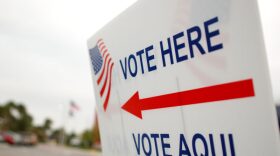The U.S. Department of Justice is ditching its longstanding position that Texas lawmakers purposefully discriminated against minority voters by passing the nation’s strictest voter identification law in 2011, according to lawyers who are challenging the state’s law.
The move comes one day before a federal judge is scheduled to hear arguments on that high-stakes voting rights question, and it highlights yet another instance in which the Trump administration has dramatically departed from the path of his predecessor.
Former President Obama’s Justice Department originally teamed up with civil rights groups against Texas throughout the long-winding legal battle over the ID law, known as Senate Bill 14. But on Monday, lawyers for U.S. Attorney General Jeff Sessions told parties that they were dropping a claim that Texas lawmakers intentionally discriminated against Latino and African-American voters.
The Justice Department's immediate plans do not include changing its position that the ID law has a “discriminatory effect” on certain voters, plaintiff’s attorneys say. A federal appeals court has already resolved that issue, ruling against Texas.
But U.S. District Judge Nelva Gonzales Ramos is scheduled to weigh a more specific question Tuesday: Whether lawmakers knowingly discriminated.
A ruling against Texas could ultimately put it back on the list of states needing federal approval (called “preclearance”) before changing election laws. A 2013 Supreme Court ruling sprung Texas and other states with a history of discrimination from that list.
Danielle Lang, deputy director of voting rights for the Campaign Legal Center, one of several groups challenging the Texas law, vowed to press on in the case — even without the federal government's help.
“None of the facts have changed, just the administration,” she said in an interview. “We will be arguing the same claim, and we think it’s really disappointing that the Department of Justice is backing away from its enforcement of voting rights.”
In a 2014 ruling, Ramos found that Texas intended to discriminate, but the U.S. Fifth Circuit Court of Appeals — in a ruling affirming the law’s discriminatory effect — instructed Ramos to reconsider the evidence. The higher court’s majority wrote that some evidence "could support" Ramos’ conclusion, but called her conclusion “infirm.”
In November, under Obama, the Justice Department argued that “a wealth of evidence” suggests that lawmakers consciously discriminated, including the state’s lengthy history of discrimination in elections and a shift in demographics that could threaten current officeholders.
The lawyers also argued that Texas Republicans took advantage of an “extraordinary degree of procedural irregularities” during the 2011 legislative session to address “a nearly nonexistent problem,” and they refused to answer direct questions about how the voting rules would affect minority voters.
The other plaintiffs have made similar arguments.
But lawyers for Texas Attorney General Ken Paxton counter that opponents have no smoking gun.
“Despite their unlimited access to the confidential communications of Texas legislators who supported SB 14,” Paxton’s team wrote, “plaintiffs could proffer no evidence that any legislator harbored even a private intention to disenfranchise minority voters.”
Texas and the U.S. had asked to delay Tuesday’s hearing until state lawmakers considered new legislation filed in the current legislative session: state Sen. Joan Huffman’s Senate Bill 5.
Her bill would add options for Texans who say they cannot “reasonably” obtain one of seven forms of ID currently required at the polls, similar to court-ordered rules temporarily in place for last November’s election. It would also create harsh criminal penalties for those who falsely claim they need to choose from the expanded list of options.
Plaintiffs argued — convincingly, it turns out — that Huffman’s bill could “ameliorate some of the discriminatory effects” of the current law. However, Huffman's bill is irrelevant to whether lawmakers discriminated against certain voters in 2011.
__________________________________________






